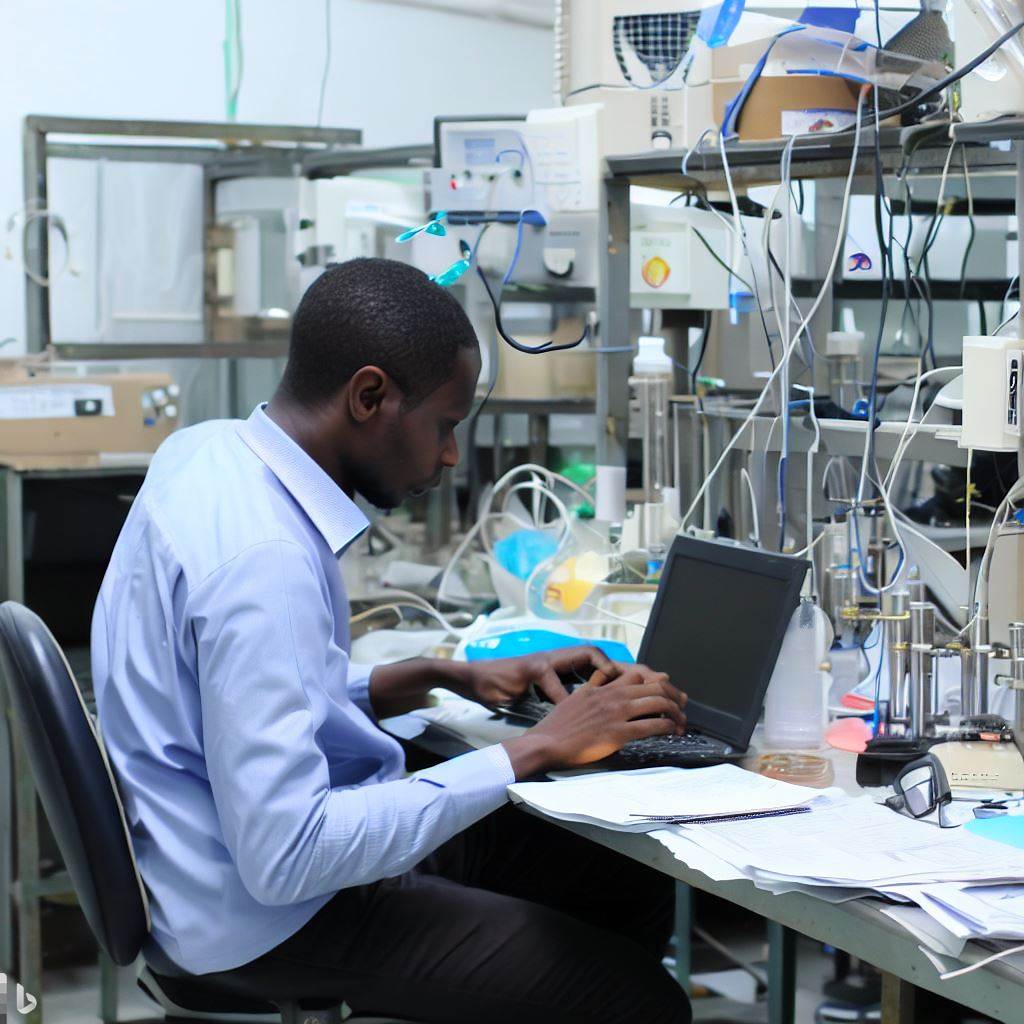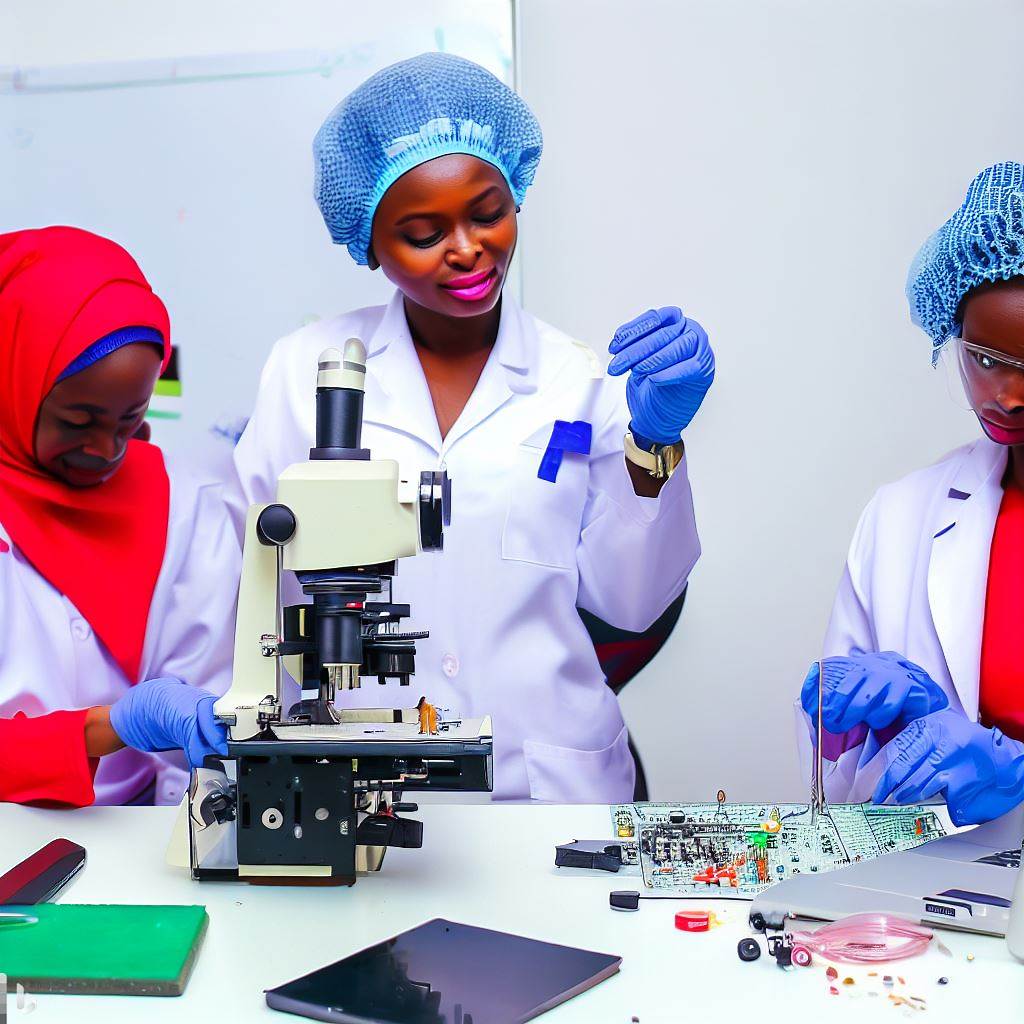Introduction
In Nigeria, the pivotal role of biomedical engineers in enhancing healthcare through the advancement of medical devices and systems is noteworthy.
This blog post delves into the specific working conditions experienced by these professionals and the associated challenges.
Biomedical engineers contribute significantly to healthcare by innovating and refining medical equipment and systems.
This blog post is dedicated to exploring the working conditions endured by biomedical engineers in Nigeria, along with the obstacles they encounter.
Overview of Biomedical Engineering in Nigeria
Overview of the Biomedical Engineering Industry in Nigeria
The biomedical engineering industry in Nigeria is steadily growing and making significant advancements.
With the increasing importance placed on healthcare, biomedical engineering has become a vital field.
Biomedical engineers are responsible for the design, development, and maintenance of medical equipment.
They combine the principles of engineering with medical and biological sciences to improve patient care.
Biomedical engineering encompasses a wide range of areas, including biomedical instrumentation and medical imaging.
Nigeria boasts a number of biomedical engineering institutions and organizations that contribute to its growth.
The industry has seen an increase in the number of healthcare facilities with advanced medical equipment.
These advancements have created a demand for skilled biomedical engineers in the country.
Growth and Demand for Biomedical Engineers in Nigeria
The growth of the biomedical engineering field in Nigeria can be attributed to several factors.
Firstly, the government has recognized the need to improve healthcare infrastructure in the country.
This has led to an increase in funding for the development and maintenance of medical equipment.
Transform Your Career in Nigeria
Discover unmatched expertise with our personalized Career Consulting service. Navigate Nigeria’s job market with a strategy tailored just for you.
Get StartedConsequently, there has been a rise in the demand for biomedical engineers who can handle these tasks.
Secondly, the awareness of the importance of biomedical engineering among healthcare professionals and policymakers has increased.
They understand that well-designed and properly functioning medical equipment is crucial for quality healthcare delivery.
This has further fueled the demand for biomedical engineers in Nigeria.
Thirdly, advancements in technology have revolutionized the healthcare industry globally, and Nigeria is no exception.
Medical equipment and devices have become more sophisticated, requiring specialized expertise to operate and maintain them.
Biomedical engineers play a crucial role in ensuring the efficiency and effectiveness of these devices.
Lastly, the growing population in Nigeria has contributed to the demand for biomedical engineers.
As the number of healthcare facilities increases, so does the need for trained professionals to operate the medical equipment.
Generally, the biomedical engineering industry in Nigeria is experiencing steady growth and demand.
The field encompasses various areas and plays a vital role in improving healthcare delivery.
With the government’s increased focus on healthcare infrastructure and technological advancements, the demand for biomedical engineers is on the rise.
As Nigeria continues to prioritize healthcare, the need for skilled professionals in the biomedical engineering field will continue to grow.
Job Responsibilities of Biomedical Engineers
Typical Job Responsibilities of Biomedical Engineers in Nigeria
- Designing and developing medical equipment and devices.
- Conducting research to improve medical technology and equipment.
- Assessing the safety and effectiveness of medical equipment and devices.
- Installing, testing, and maintaining medical equipment.
- Training healthcare professionals on the use of medical equipment and devices.
- Collaborating with healthcare providers to understand their equipment needs.
- Modifying existing equipment to enhance its functionality or meet specific requirements.
- Managing and supervising the implementation of biomedical projects.
- Keeping up-to-date with advancements in biomedical engineering and technology.
- Ensuring compliance with regulatory standards and procedures.
Specialized Roles and Areas of Expertise within the Field
Biomedical engineering encompasses various specialized roles and areas of expertise in Nigeria:
- Clinical Engineering: Involves working closely with clinicians to assess, select, and integrate medical technology into clinical settings.
- Rehabilitation Engineering: Focuses on developing assistive technologies and devices to help individuals with disabilities regain independence.
- Biomechanics: Involves studying the mechanics of human body movements and developing tools or techniques to improve physical performance or prevent injuries.
- Bioinstrumentation: Specializes in designing and developing medical instruments and sensors used for measuring physiological signals and diagnostics.
- Medical Imaging: Includes designing, developing, and enhancing techniques and equipment used in medical imaging, such as MRI, CT scans, and ultrasound.
- Tissue Engineering: Focuses on developing artificial tissues and organs for transplantation or replacement purposes.
- Clinical Systems Engineering: Involves integrating various medical technologies, data, and systems to optimize healthcare delivery processes and patient outcomes.
- Genetic Engineering: Applies engineering principles to manipulate genetic material for medical and research purposes.
- Biomechanical Engineering: Focuses on designing and developing orthopedic implants, prosthetics, and other devices to improve mobility and quality of life.
- Medical Device Sales and Marketing: Involves promoting and selling medical devices to healthcare facilities and professionals.
These specialized roles allow biomedical engineers in Nigeria to focus their expertise on specific areas and make significant contributions to healthcare and technology advancements.
Challenges Faced by Biomedical Engineers in Nigeria
Limited Availability of Resources and Infrastructure
- Biomedical engineers in Nigeria face the challenge of limited availability of resources for their work.
- The lack of advanced medical equipment and facilities hinders their ability to provide high-quality healthcare.
- Insufficient funding and investment in healthcare infrastructure affects the efficiency and effectiveness of biomedical engineers.
- Inadequate access to essential resources like medical supplies, tools, and technology makes their job more challenging.
- The scarcity of specialized laboratories and research facilities restricts their ability to conduct experiments and innovate.
Lack of Standardized Regulations and Guidelines
- Biomedical engineers in Nigeria encounter difficulties due to the absence of standardized regulations and guidelines.
- The lack of clear and enforceable rules makes it challenging for them to maintain safety standards.
- Without standardized regulations, the quality and reliability of biomedical equipment and devices may be compromised.
- The absence of guidelines for conducting clinical trials and experiments poses ethical and safety concerns.
- Inconsistent regulations across different states and institutions create confusion and hinder collaboration among engineers.
Disparity in Salary and Benefits Compared to Other Engineering Fields
- Biomedical engineers in Nigeria face the issue of low salary and inadequate benefits compared to other engineering fields.
- Their work requires specialized skills and education, yet they receive lower compensation.
- The lack of recognition and value for their expertise discourages talented professionals from entering the field.
- Biomedical engineers often have to seek additional sources of income, which may distract them from focusing on their work.
- The disparity in salary also impacts the retention of skilled biomedical engineers, leading to brain drain and talent loss.
In fact, biomedical engineers in Nigeria confront various challenges that hinder their effectiveness and growth in the field.
The limited availability of resources and infrastructure restricts their ability to provide high-quality healthcare services.
The absence of standardized regulations and guidelines creates safety and reliability concerns.
Additionally, the disparity in salary and benefits compared to other engineering fields demotivates talented professionals from pursuing a career in biomedical engineering.
It is important for the government and relevant authorities to address these challenges and provide necessary support to promote the development of the biomedical engineering field in Nigeria.
Read: Universities Offering Robotics Engineering in Nigeria
Working Conditions in Nigeria
Describe the work environment for biomedical engineers in Nigeria
- Biomedical engineers in Nigeria typically work in hospitals, research institutions, or medical device manufacturing companies.
- They may also work in government agencies or private consultancy firms.
- The work environment can be fast-paced, with a constant need to meet deadlines and solve problems.
- Biomedical engineers often collaborate with other healthcare professionals, such as doctors and nurses.
- They may also interact with patients to better understand their needs and develop appropriate medical devices.
Discuss the typical working hours and schedule
- Biomedical engineers in Nigeria usually work regular office hours, from Monday to Friday.
- The usual working day starts at 8 am and ends at 5 pm, with a one-hour break for lunch.
- However, depending on the project or workload, they may need to work additional hours, including evenings and weekends.
- Sometimes they might be on call, especially in emergency situations or when urgent repairs are needed.
- Despite the long hours, biomedical engineers find their work fulfilling and rewarding.
Mention the physical and mental demands of the job
- The physical demands of being a biomedical engineer in Nigeria can vary depending on the specific tasks.
- They may need to lift and carry heavy medical equipment or prototype devices.
- They also spend a significant amount of time working on computers and using specialized software.
- The work can be mentally demanding, as biomedical engineers need to analyze complex data and solve intricate technical problems.
- They must stay up to date with the latest advancements in medical technology and scientific research.
Highlight the challenges and opportunities in the field
- One of the challenges faced by biomedical engineers in Nigeria is the limited availability of resources and funding.
- This can make it difficult to acquire state-of-the-art equipment or conduct extensive research.
- However, it also presents opportunities for innovation and finding cost-effective solutions to healthcare problems.
- Biomedical engineers in Nigeria play a crucial role in developing medical devices tailored to the local context and addressing specific health issues.
- They have the opportunity to make a significant impact on healthcare outcomes and improve the quality of life for Nigerians.
Discuss the potential career growth and prospects for biomedical engineers
- As the healthcare sector in Nigeria continues to expand, the demand for biomedical engineers is expected to increase.
- There is a growing need for skilled professionals who can develop and maintain medical equipment and technology.
- Biomedical engineers can advance their careers by specializing in specific areas, such as imaging or rehabilitation engineering.
- They can also pursue higher education, such as a master’s or doctoral degree, to become researchers or educators.
- Additionally, biomedical engineers in Nigeria have the opportunity to collaborate with international organizations and participate in global research projects.
In short, the working conditions for biomedical engineers in Nigeria can be challenging but rewarding.
They work in diverse environments, collaborating with healthcare professionals and interacting with patients.
The typical working hours are office-based, but additional hours may be required.
Publish Your Professional Profile, Business or Brand
Showcase your expertise, gain trust, and boost visibility instantly on Professions.ng.
Publish NowThe job demands physical strength, mental agility, and a constant thirst for knowledge.
While there may be limitations, biomedical engineers in Nigeria also have the chance to contribute to innovative solutions and have a significant impact on healthcare outcomes.
With the growing demand for their skills, there are ample prospects for career growth and development in this field.
Read: Nigerian Biomedical Engineers: Making a Global Impact

Opportunities for Professional Development
Highlight the importance of continuous learning and professional development
Continuous learning and professional development are essential for biomedical engineers in Nigeria to stay updated with the latest advancements in their field.
It helps them enhance their skills, knowledge, and expertise, ensuring they remain competitive in the job market.
Discuss the availability of training programs and workshops in Nigeria
Nigeria offers several training programs and workshops for biomedical engineers, providing them with opportunities to enhance their technical skills and knowledge.
These programs are often organized by professional associations, universities, and research institutions across the country.
Mention the relevance of professional certifications in advancing career prospects
Professional certifications are vital for Nigerian biomedical engineers seeking career progression, validating their skills and boosting employability.
In a dynamic field like biomedical engineering, staying current is paramount.
Nigeria offers diverse avenues for learning, such as workshops by associations, universities, and research institutions.
These cover technology, regulations, and best practices. Attending fosters expertise, providing insights from industry leaders, hands-on practice, and improved problem-solving abilities.
Esteemed certifications like Certified Biomedical Equipment Technician (CBET) and Certified Clinical Engineer (CCE) are globally recognized, enhancing credibility.
They signal commitment, competence, and adherence to standards, impressing employers and fostering confidence in handling intricate tasks.
Furthermore, these certifications unlock advanced roles, yielding better pay and exclusive opportunities.
Nigerian biomedical engineers must prioritize ongoing learning and certifications for career growth.
Amid these advancements, it’s important to consider working conditions for Biomedical Engineers in Nigeria.
Read: Day in the Life of a Nigerian Biomedical Engineer
Efforts to Improve Working Conditions
Initiatives taken by professional organizations in Nigeria
- Professional organizations like the Nigerian Society of Biomedical Engineers (NSBE) have been actively addressing working conditions.
- NSBE conducts workshops and seminars to educate biomedical engineers on workplace safety.
- They collaborate with industry experts to develop guidelines and standards for improving working conditions.
- The organization advocates for fair wages, job security, and benefits for biomedical engineers.
- NSBE organizes networking events to create a platform for professionals to share their experiences and challenges.
- Through these initiatives, professional organizations aim to create awareness and push for better working conditions.
Government interventions and policies to promote better working conditions
- The Nigerian government recognizes the importance of biomedical engineering and its impact on healthcare.
- They have implemented regulations to ensure occupational health and safety for biomedical engineers.
- Government agencies conduct inspections to monitor and enforce compliance with these regulations.
- There are laws in place to protect workers’ rights and provide a legal framework for fair employment practices.
- The government encourages the establishment of joint labor-management committees to address working condition concerns.
- Efforts are being made to improve infrastructure and access to resources in healthcare facilities.
- The government aims to strengthen the healthcare system, which indirectly improves working conditions for biomedical engineers.
Collaborations with international organizations
- Nigeria actively collaborates with international organizations like the World Health Organization (WHO).
- These collaborations focus on sharing best practices and expertise in improving biomedical engineering working conditions.
- International organizations provide technical assistance and support to Nigerian biomedical engineers.
- Through these collaborations, Nigerian engineers receive training and capacity building opportunities.
- International partnerships contribute to the development of standards and guidelines for better working conditions.
Overall, both professional organizations and the Nigerian government are working diligently to improve the working conditions for biomedical engineers.
Through initiatives, collaborations, and policies, they aim to create safer and more conducive work environments that benefit both the professionals and the healthcare system as a whole.
Read: Postgraduate Studies: Biomedical Engineering in Nigeria
Recommendations for Enhancing Working Conditions
Recommendations for Government and Industry Stakeholders
- Government should establish and enforce stricter regulations for working conditions in the biomedical engineering field.
- Government should provide incentives for companies to improve working conditions for biomedical engineers.
- Industry stakeholders should conduct regular assessments of working conditions to identify areas for improvement.
- Industry stakeholders should invest in training and development programs to enhance the skills and knowledge of biomedical engineers.
- Government and industry stakeholders should create a platform for continuous dialogue to address concerns and find solutions.
- Industry stakeholders should establish clear career progression paths for biomedical engineers, offering opportunities for growth and advancement.
- Government should collaborate with industry stakeholders to develop standards for working conditions in the biomedical engineering sector.
- Industry stakeholders should establish support systems to address work-related stress and mental health issues among biomedical engineers.
- Government should provide funding or tax incentives to companies that prioritize improving working conditions for biomedical engineers.
- Industry stakeholders should promote diversity and inclusivity in the workplace to create a supportive and inclusive environment for all biomedical engineers.
Strategies to Increase Funding for Biomedical Engineering Projects
- Allocate a specific portion of the national budget to fund biomedical engineering projects.
- Evaluate and prioritize funding based on the potential impact and innovation of projects.
- Establish partnerships with international organizations and foreign investors to access additional funding sources.
- Encourage industry collaboration through public-private partnerships to pool resources for project funding.
- Facilitate access to research grants and funding opportunities from government agencies and foundations.
- Establish a dedicated fund or venture capital fund to provide financial support specifically for biomedical engineering projects.
- Promote crowdfunding campaigns to raise funds for specific projects or research initiatives.
- Invest in local capacity building to cultivate a pool of skilled biomedical engineers who can attract external funding.
- Encourage philanthropic organizations and individuals to support biomedical engineering projects through donations or sponsorships.
- Explore innovative financing models, such as social impact bonds, to attract private investments in biomedical engineering.
Importance of Collaboration between Industry and Academia
- Industry and academia should establish collaborative research programs to bridge the gap between theory and practice.
- Promote knowledge exchange and joint projects between universities and biomedical engineering companies.
- Industry should actively engage with academic institutions to provide internships and job placement opportunities.
- Ensure curriculum alignment with industry needs through participation in curriculum development and review processes.
- Establish industry-led certification programs to validate the skills and competencies of biomedical engineering graduates.
- Encourage industry professionals to contribute as guest lecturers or adjunct faculty members at universities.
- Increase funding for research collaborations between academia and industry to drive innovation and development.
- Promote networking events and conferences that bring together industry professionals and academia to foster collaboration.
- Establish joint training programs to enhance the practical skills of biomedical engineering graduates.
- Industry should provide mentorship programs to support the professional growth and development of biomedical engineers.
In short, enhancing working conditions for biomedical engineers in Nigeria requires active collaboration between government, industry stakeholders, and academia.
Stricter regulations, increased funding, and improved collaboration are crucial for creating a supportive and sustainable environment that allows biomedical engineers to thrive in their careers.
By implementing these recommendations, Nigeria can attract and retain talented professionals in the field, contributing to advancements in healthcare technology and improving the overall quality of healthcare services in the country.
Read: Career Paths for Biomedical Engineers in Nigeria
Conclusion
In this discourse, we have extensively explored the working conditions endured by biomedical engineers in Nigeria.
Significantly, the imperative of enhancing these conditions cannot be overstated; it is a pivotal factor in nurturing advancement and ingenuity in this domain.
For those aspiring to become biomedical engineers in Nigeria, it’s crucial to recognize that your unwavering commitment and proficient aptitude hold the potential to usher in affirmative transformations.
Persistently strive ahead, for collectively, we possess the ability to carve a more promising prospect for the realm of biomedical engineering within our nation.
Seize the initiative and become the agent of change. Remember, every action you take has the potential to catalyze a more favorable course.
By doing so, we can progressively reshape the landscape and steer the trajectory of biomedical engineering towards a brighter horizon for our country.




